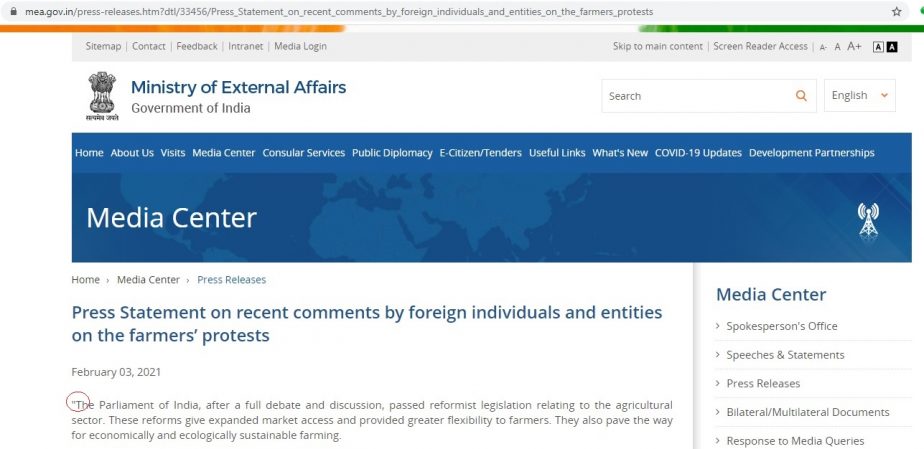In a sign that recent tweets by a diverse group of international celebrities continue to rankle the Narendra Modi government, the Delhi Police on February 4 filled a criminal complaint against unnamed persons for authoring a protest “toolkit” that was first shared by teenage climate activist Greta Thunberg on Twitter, then deleted and once again tweeted out (after modification) by her.
In a press conference in the early evening local time, Delhi Police Special Commissioner Praveer Ranjan noted: “Taking cognizance of the toolkit, the police has registered a case for spreading disaffection against the government of India (sedition) and disharmony between groups on religious, social and cultural grounds, and criminal conspiracy to give shape to this.”
The Delhi Police has alleged that the toolkit is the handiwork of a Sikh secessionist group.
The press conference followed an afternoon’s reporting by Indian media that noted that Thunberg herself had been named in the “first information report,” (FIR) prompting Indian and foreign commentators to express their dismay at the seemingly absurd turn of events — not the least because it would be impossible for the Delhi Police to gain access to Thunberg, a Swedish citizen who turned 18 only last month. (Reacting to this news, The Diplomat’s Australia correspondent Grant Wyeth pithily tweeted: “The Indian state is losing its mind.”)
While the Delhi Police clarified that it has not named anyone in its FIR, given that the toolkit – in reality, a simple how-to for peaceful demonstrations to support the cause of protesting Indian farmers – was tweeted by Thunberg, it is unlikely that she will not be named as a party in the criminal investigation. Of course, that assumes that there is more than a performative dimension, aimed at drumming up popular support, to the Delhi Police’s action.
Following the February 2 tweets by Thunberg, popular entertainer Rihanna, and a few others (including Meena Harris, the niece of U.S. Vice President Kamala Harris) the Indian government responded in a fashion many observers (including me) described as panicked overreaction. The MEA issued a press statement on February 3 condemning them, arguably the first MEA response in recent memory that specifically focused on statements by private citizens.
Not content with issuing it, cabinet members in the Modi government — in an extraordinary display of defiance against what it clearly seeks to portray as a global conspiracy – tweeted their resolve to not bow to international pressure and intervention by vested, malign interests. This was followed by a mass social media blitz involving a veritable who’s-who of Indian civil society who also pledged to do so, in some cases in identical language, leading many to speculate that it formed part of a larger coordinated counter-campaign, either orchestrated by the Modi government or the ruling Bharatiya Janata Party.
One data point that some have used to argue that many of the tweets from Indian celebrities were cut-paste jobs is the presence of quote marks in a tweet by a BJP member of parliament. Curiously enough, a close look at the February 3 MEA statement also points to a similar peculiarity.

Screenshot of MEA statement taken on February 4, 22:52 IST

Screenshot of MEA statement taken on February 4, 22:53 IST
Given that no other recent press statements bear such marks (see this, this, or this as three examples of statements immediately following the February 3 one), one is left wondering about the peculiarity in this one. At the very least, this suggests that the statement was uploaded to the MEA website in a hurry, and without thorough proofreading. An additional possibility is that the unorthodox nature of the statement, given that it also included hashtags, meant that the body of the text had to be separated from the hashtags themselves. In any event, the statement bears witness to its extraordinary nature.
With the farmers’ protests showing no signs of abating anytime soon, it would be natural to expect that while the temperature on ground rises, social media battles around it too will intensify.

































